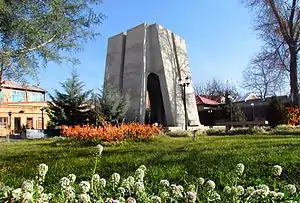Awhadi Maraghai
Awhaduddin Awhadi Maraghei (also spelled Ohadi) (1271–1338) was a Persian[1][2] poet from the city Maragheh in Iran.

He is usually surnamed Maraghei, but also mentioned as Awhadi Esfahani because his father hailed from Isfahan and he himself spent part of his life there.[3] He first chose the pen-name Ṣāfī, but changed it to Awhadi after becoming a devotee of the school of the famous mystic Shaikh Auhaduddin Kermani.
Work
Awhadi has a divan of 8000 verses which consists of the Persian poetic forms qasidas, ghazals, tarji'bands and quatrains. The qasidas are in praise of Abu Said and his Vizir, Ghiyath al-Din, the son of Rashid al-Din Fazlah. His other poems play on various themes including mysticism, ethics, and religious subjects. He also is known for his marsiyas (elegies).
In addition to his divan of shorter poems, he has left two important Persian works in Masnavi form. The Dah-nama or Manteq al-Oshaaq consists of 600 verses and was completed in 1307 for Wajih Al-din Yusef, the grandson of the famous Nasir al-Din Tusi. His most important and well known work was the Masnavi Jām-i Jam ("The Cup of Jamshid") also called Jām-e-Jahānbīn ("The mirror of the universe"). It was written in 1333 and has 5000 verses and follows the style of Sanai's Hadiqah. Awhadi died in 1338 and is buried in Maragheh.
Sample quotes from Jām-i Jam:
- «پایداری به عدل و داد بود// ظلم و شاهی، چراغ و باد بود»
- «خاك از ایشان چگونه مشك شود// گر به دریا روند خشك شـود»
- «خواب را گفتهای برادر مرگ// چو بخسبی همی زنی درِ مرگ»
- «دزد را شحنه راه و رخت نمود// کشتن دزد بیگناه چه سود؟// دزد با شحنه چون شریک بود// کوچهها را عسس چریک بود»
- «نفس خود را بكش نبرد اين است// منتهای كمال مرد این است»
Ali Karamustafa notes in Der Islam, narrating about perceptions of Turkomans in Iran and the lands further west in the 12th to 14th centuries, that Awhadi Maraghai considered Turkomans to be "unthinking (bī-fekr) and naïve country bumpkins easily fooled by thieves."[4]
Fahlavi Poem
Awhad Maraghai has three ghazals in the old dialect of Isfahan, arranged under the title of "in the language of Isfahan".
See also
Notes
- G. Meredith-Owens, “Awhadi, Rukn al-Din”, Encyclopaedia of Islam, Second Edition. Edited by: P. Bearman , Th. Bianquis , C.E. Bosworth , E. van Donzel and W.P. Heinrichs. Brill, 2009. excerpt: "Awhadi Rukn al-Din, Persian poet born c. 680/1281-2 at Maragha in Adharbaydjan.”
- Buchanan-Brown, John Steinberg, S. H., Sigfrid Henry Cassell's Encyclopaedia of World Literature 3 Volume. 2nd revised and enlarged ed., general editor J. Buchanan-Brown London, Cassell, 1973 - p. 86 Auhadi (Maragheh 1337/38), Persian poet, author of a mystical poem
- AWḤADĪ MARĀḠAʾĪ in Encyclopedia Iranica by Dj. Khaleghi-Motlagh
- Karamustafa, A. (2020). "Who were the Türkmen of Ottoman and Safavid lands? An overlooked early modern identity". Der Islam. 97 (2): 482. doi:10.1515/islam-2020-0030.
References
- E.G. Browne. Literary History of Persia. (Four volumes, 2,256 pages, and twenty-five years in the writing). 1998. ISBN 0-7007-0406-X
- Jan Rypka, History of Iranian Literature. Reidel Publishing Company. ASIN B-000-6BXVT-K
- AWḤADĪ MARĀḠAʾĪ in Encyclopædia Iranica by Dj. Khaleghi-Motlagh.
- Fahlaviyat in Encyclopædia Iranica by Dr. Ahmad Taffazoli,